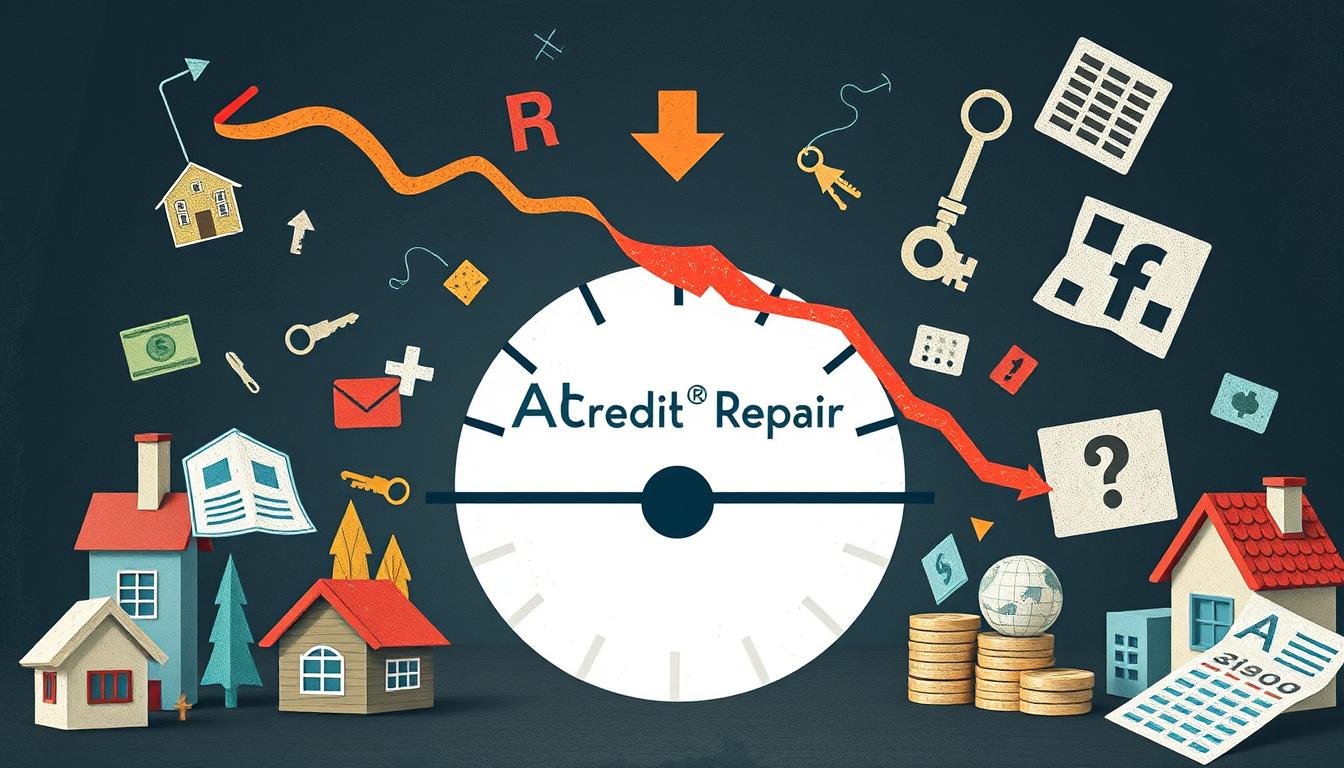Getting a mortgage is a big step in buying a home. But what if your credit score drops before closing? Let’s explore what could happen and how to handle it.
Your credit score is crucial for mortgage approval. Lenders use it to judge if you’re trustworthy with money. A sudden drop can put your loan at risk.
It might lead to higher interest rates. In some cases, you could even lose your chance to buy the home.
Key Takeaways
- A drop in your credit score before closing can impact mortgage approval and loan terms.
- Understand the factors that can cause a credit score decrease, such as late payments or changes in credit utilization.
- Monitor your credit reports regularly during the home-buying process to identify and address any issues.
- Work with your lender to understand the implications of a credit score change and explore potential solutions.
- Take proactive steps to protect your credit, such as avoiding new credit applications and maintaining responsible financial habits.
Understanding Credit Scores and Their Impact on Mortgage Approval
Credit scores show how trustworthy you are with money. They range from 300 to 850. Lenders use this number to decide if you can get a mortgage.
Your score helps them guess if you’ll pay back a loan. A higher score means you’re less risky to lend to.
What is a Credit Score?
A credit score is a number that sums up your credit history. It’s based on how you’ve handled money in the past. The credit score definition includes things like payment history and credit use.
Scores usually fall between 300 and 850. Higher scores mean lower risk. Lenders look at these credit score factors when deciding about mortgages.
How Credit Scores Affect Mortgage Lending Decisions
Lenders care a lot about your credit score for mortgage approval criteria. A high score can get you better loan terms. A low score might mean higher rates or no loan at all.
| Credit Score Range | Mortgage Approval Impact |
|---|---|
| 760-850 | Excellent credit, likely to receive the best interest rates and terms |
| 700-759 | Good credit, may still receive favorable rates and terms |
| 640-699 | Fair credit, may face higher interest rates or additional requirements |
| 580-639 | Poor credit, may have difficulty obtaining mortgage approval |
| 500-579 | Very poor credit, unlikely to receive mortgage approval |
“A good credit score is essential for securing the best mortgage terms and rates. Lenders use this information to assess the risk of lending to a particular borrower.”
Potential Reasons for a Credit Score Drop Before Closing
Your credit score may drop during mortgage application for various reasons. These include new credit inquiries, missed payments, changes in credit use, and credit report errors.
Hard inquiries can cause a small, temporary dip in your credit score. These checks are necessary for loan applications but can affect your overall score.
Financial changes during the mortgage process can also impact your credit. Missing a payment or maxing out a card can hurt your credit utilization ratio.
Credit report errors can significantly decrease your score. Inaccuracies like incorrect payment history or fraudulent accounts can create challenges during mortgage approval.
| Reason for Credit Score Drop | Impact on Mortgage Approval |
|---|---|
| New credit inquiries | Temporary decrease in credit score |
| Missed or late payments | Longer-term decrease in credit score |
| Changes in credit utilization | Decrease in credit score due to higher debt-to-credit ratio |
| Credit report errors | Potential for significant credit score decrease |
Knowing these factors helps borrowers maintain a healthy credit score. It ensures a smoother loan application process and increases chances of mortgage approval.

Consequences of a Credit Score Decrease on Your Mortgage
A sudden credit score drop can greatly impact your mortgage application. Lenders carefully check your creditworthiness. A declining credit profile may lead to higher rates, stricter terms, or loan denial.
Higher Mortgage Rates
A lower credit score may make lenders see you as riskier. They might offer higher mortgage rates to balance this risk. This can make your home loan more expensive.
Higher rates can make monthly payments harder to afford. It’s important to maintain a good credit score.
Loan Approval Jeopardy
A credit score drop might put your loan approval at risk. Lenders have specific credit score limits. If you fall below these, they may deny your loan application.
Alternatively, they could ask for a bigger down payment. They might also add extra loan terms to reduce their risk.
| Consequence | Impact |
|---|---|
| Higher Mortgage Rates | Increased overall cost of the home loan, making it more challenging to afford monthly payments |
| Loan Approval Jeopardy | Potential loan denial or stricter loan requirements, such as a larger down payment or additional credit criteria |
“A drop in your credit score can have serious financial consequences, making it crucial to monitor your credit and take proactive measures to maintain a healthy credit profile throughout the mortgage process.”
What Happens If Your Credit Score Drops Before Closing?
A credit score drop before mortgage closing can greatly affect your loan application. Lenders watch your finances closely during the entire process. Big changes may lead to a new review of your creditworthiness.
A lender notification about a credit score drop impact means reassessing your mortgage terms. This could change your interest rate or down payment. It might even put your loan approval at risk.
- Increased Interest Rates: A lower credit score could lead to a higher interest rate. This increases your overall mortgage cost.
- Loan Approval Jeopardy: A big credit score drop may cause the lender to deny your loan. You might have to start over.
| Scenario | Impact |
|---|---|
| Credit Score Drop of 20-50 Points | Potential for higher interest rates or additional requirements from the lender |
| Credit Score Drop of 50+ Points | Increased risk of loan denial or significant changes to the loan terms |
Keeping a strong credit score during the mortgage closing process is key. It helps secure the best loan terms. Stay alert and address any potential credit score drop impact quickly.
This can help you avoid unexpected problems and delays. Proactive steps can make your mortgage journey smoother.

“A drop in your credit score before closing can set off alarm bells for lenders, potentially leading to unfavorable changes in your loan terms or even loan denial.”
Monitoring Your Credit Score During the Mortgage Process
A healthy credit score is vital for the mortgage process. Regularly monitoring your credit score can impact your mortgage approval and terms. Understanding credit building strategies and good financial habits helps you buy a home confidently.
Tips for Maintaining a Healthy Credit Score
Try these strategies to keep your credit score high:
- Review your credit reports often. Dispute any errors that could hurt your score.
- Pay all bills and credit card balances on time. This shows you’re a reliable borrower.
- Keep credit card balances low. Aim for less than 30% of your credit limit.
- Don’t open new credit accounts during the mortgage application. This can lower your score temporarily.
- Become an authorized user on a well-managed credit card. This can boost your score.
Following these credit monitoring tips helps keep your credit score strong. Credit score tracking is key during the mortgage process.
“Maintaining a healthy credit score is essential for securing the best possible mortgage terms and avoiding setbacks during the home buying process.”
Addressing Credit Score Issues Before Closing
Has your credit score dropped before your mortgage closing? Act fast to fix it. Check your credit reports for mistakes. This is called a credit report dispute. It’s vital to ensure your credit file is correct.
After disputing errors, talk to your lender. Open communication is key. Your lender might help find a solution. They could modify the loan terms or approve the loan despite the score drop.
Reviewing Credit Reports for Errors
Look closely at your credit reports to find errors causing a credit score drop. Common issues include wrong account info and outdated payment history. Fraudulent accounts or identity theft can also be problems.
Dispute these errors with credit bureaus. This can boost your credit score and improve your chances of closing your mortgage.
Negotiating with Lenders
If your score has dropped, talk to your lender right away. They might negotiate loan terms or approve the loan anyway. Be ready to explain the issue and your steps to fix it.
Keep the lines of lender communication open. Your lender might offer advice or other solutions. This can help you overcome credit issues and secure your mortgage.

| Reason for Credit Score Drop | Potential Solution |
|---|---|
| Errors on credit report | Dispute credit report errors |
| Recent late payments | Negotiate with lender for loan modification |
| Increased credit utilization | Reduce credit card balances to improve credit utilization ratio |
Protecting Your Credit During the Home Buying Process
A healthy credit score is vital when buying a home. Smart credit management strategies and good financial habits can boost your mortgage approval chances. Let’s explore ways to protect your credit while house hunting.
Here are some tips to safeguard your credit:
- Avoid taking on new debt: Don’t open new credit cards or get loans during the mortgage application process. This can hurt your credit utilization and lower your credit score.
- Keep credit card balances low: Try to keep your credit card balances below 30% of your limit. This shows responsible credit management and maintains a good credit utilization ratio.
- Limit credit inquiries: Hard inquiries on your credit report can temporarily impact your score. Only apply for credit when absolutely necessary.
Be mindful of your financial habits and monitor your credit closely. This helps keep your credit score stable and strengthens your mortgage application.
“Maintaining a healthy credit score is not just about the numbers – it’s about demonstrating your commitment to responsible credit management and financial discipline.”
Proactive credit management is crucial during the home buying process. Stay alert and make smart decisions. Build a strong financial foundation for your future home ownership dreams.
When to Seek Professional Assistance
Navigating the mortgage process can be tricky. If you’re struggling with credit score issues, professional help might be useful. Consider working with a credit counseling service, financial advisor, mortgage broker, or seeking legal consultation.
Credit counseling services can review your credit report and help improve it. They’ll identify errors and create a plan to rebuild your credit. Financial advisors guide you on budgeting and debt management.
Mortgage brokers can find the right lender and loan program for you. Legal professionals advise on your rights during the home buying process. These experts are especially helpful if your credit score drops before closing.
| Professional Assistance | How They Can Help |
|---|---|
| Credit Counseling | Review credit report, identify errors, develop credit-rebuilding plan |
| Financial Advisor | Provide guidance on budgeting, debt management, and financial strategies |
| Mortgage Broker | Assist in finding the right lender and loan program |
| Legal Consultation | Advise on rights and obligations during the home buying process |
Professional support can boost your confidence in the mortgage process. It increases your chances of buying a home, even after a credit score drop.
Conclusion
A strong credit score is crucial for securing mortgage approval and favorable loan terms. Credit score drops can significantly impact your home buying journey. By understanding the consequences and managing your credit, you can increase your chances of success.
A credit score decrease can lead to higher interest rates or jeopardize loan approval. This can affect the affordability and long-term financial implications of your home purchase. Monitoring your credit score throughout the process is essential.
Protect your credit by reviewing reports for errors and negotiating with lenders. Seek professional help if needed. Stay vigilant to mitigate risks associated with credit score drops.
“Maintaining a healthy credit score is not just a box to check, but a vital strategy for navigating the mortgage approval process with confidence and success.”
A credit score drop before closing can have major consequences. However, proactive credit management and understanding potential impacts can help overcome this challenge. With these steps, you can achieve your homeownership goals.
| Potential Consequences | Mitigation Strategies |
|---|---|
| Higher interest rates | Review credit reports for errors |
| Loan approval jeopardy | Negotiate with lenders |
| Increased monthly payments | Seek professional assistance |
Key Takeaways
A credit score drop before closing can greatly impact your mortgage approval. It’s crucial to understand the potential consequences and take action to protect your loan.
A lower credit score may lead to higher interest rates or stricter loan terms. In some cases, it could even put your loan approval at risk.
Monitoring your credit regularly is essential during the home-buying process. Take steps to maintain a healthy credit profile to avoid any surprises.
If your score drops, act quickly. Review your credit reports for errors and talk to your lender about options.
Consider seeking help from a credit counselor or financial advisor. They can guide you through these challenges effectively.
- A credit score drop can result in higher interest rates, stricter loan terms, or loan denial
- Regularly monitor your credit and take steps to maintain a healthy credit profile during the mortgage process
- If your credit score drops, review your credit reports, negotiate with your lender, and consider seeking professional assistance
Understanding the impact of a credit score drop can help protect your mortgage approval. It can also help you secure better loan terms.
Your credit health is vital in the home-buying journey. Prioritize responsible credit management throughout the entire process.

“Maintaining a strong credit profile is crucial during the mortgage process, as even a slight drop in your credit score can have significant consequences.”
Additional Resources
Need more info on credit scores and home buying? Check out these helpful resources:
The Consumer Financial Protection Bureau offers a guide on credit scores. It explains what affects your credit rating. You’ll learn how to keep a healthy credit profile.
Nerdwallet’s article “How to Improve Your Credit Score Before Buying a Home” is useful. It gives practical tips to boost your creditworthiness before house hunting.
The Mortgage Reports’ home buying guide is great for beginners. It covers mortgages and real estate basics.
The Federal Trade Commission has financial literacy resources. Your local bank might offer similar help. These can guide you through the home buying process.

